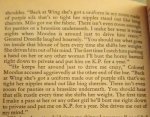Mr. Tea
Let's Talk About Ceps
There's a lot of sitting down at a feast, exchanging pleasantries, someone recounting a story then everyone retiring to bed.
Yeah you can tell it's a big influence on J.R.R.T. in that sense.
There's a lot of sitting down at a feast, exchanging pleasantries, someone recounting a story then everyone retiring to bed.
There's a film of The Killer Inside Me no? Was ok if I recall, should check the book.
It's Kafka's birthday. I must read some Kafka.
Just picked up a book from the shelf called Stone Junction by Jim Dodge, sounds pretty weird; an orphaned child is taken under the wings of the Alliance of Magicians and Outlaws etc etc with an introduction by Pynchon which must have been why I bought it.
Finished Iliad about a week ago... something that really jars is that very often a character will say several sentences to another, and then almost immediately the second character will repeat the entire speech - a whole paragraph! - to a third. Just not something you'd ever see in a novel, unless the author were aiming for a very specific effect.
Now reading Catch-22 again before watching the series on Channel 4.

Drawing on the definitions laid down by the medieval interpreters of the scriptures, O'Connor noted, "The kind of vision the fiction writer needs to have, or develop, in order to increase the meaning of his story is called anagogical vision, and that is the kind of vision that is able to see different levels of reality in one image or situation." After continuing her discussion, in which she considers two other kinds of interpretation used by the medieval commentators — the allegorical and the topological, she continues, "one they called anagogical, which had to do with the Divine life and our participation in it . . . was also an attitude toward all creation, and a way of reading nature which included most possibilities, and I think it is this enlarged view of the human scene that the fiction writer has to cultivate if he is ever going to write stories that have any chance of becoming a permanent part of our literatures."
Flannery O'Brien
Flan O'Brien and... Flannery O'Connor is it?You've combined two different writers there.
The one who wrote True Blood?
